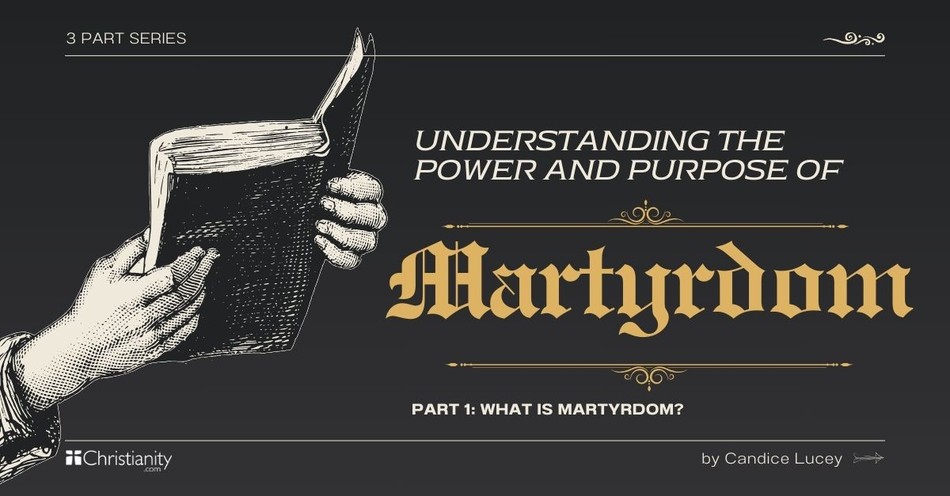What Is a Martyr Complex?
“A person with a martyr complex will sacrifice his or her own needs to please others. But a martyr also feels helpless—trapped and victimized by other people’s demands “ explains Sharon Martin. This is a pattern of thoughts and behaviors which causes problems internally and relationally. Since there are true martyrs in the Christian world, what is the difference between a martyr and someone with a complex?
What Is Martyrdom?
There is an intense kind of martyrdom where someone is persecuted for believing something and expressing this belief. Martyrs are sometimes tortured and killed, sometimes emotionally abused, bullied, and discriminated against. They face tremendous pressure on a regular basis, leading to isolation, exhaustion, and physical or emotional harm. Countless Christians have given up their safety, their lives, their money, and their former way of life to promote Christ and care for people.
A martyr is one who suffers rather than deny Christ or shirk the responsibility of living like Jesus. This person is empowered by the Holy Spirit to pursue God’s glory, not personal glory. “For it has been granted to you that for the sake of Christ you should not only believe in him but also suffer for his sake”. (Philippians 1:29)
Martyrs might face pressure within their own families. Jesus warned his disciples, “I have come to set a man against his father, and a daughter against her mother, and a daughter-in-law against her mother-in-law. And a person's enemies will be those of his own household.” (Matthew 10:34-36) Violence, exclusion, insults, or silent treatment are just some forms of persecution martyrs endure. Sometimes, they deal with oppression at work, where expectations from management are more difficult than for non-Christian co-workers. They will be abused and taken advantage of, especially when financial pressures are so great that resigning seems impossible and there is no sympathetic ear to hear their cause.
What Martyrdom Is Not
One parent might pick up after everyone, do all of the chores, cook the meals, and quietly fume while everyone else thinks he or she enjoys cleaning and cooking. Unknown to the family, resentment is growing in this person’s heart.
A community member easily recognized from many volunteer activities, is approached by several organizations to participate in assorted fundraisers. Proud of being seen as a servant, or afraid to disappoint people by saying “no”, this individual says “yes” to everyone and starts to feel burned out. This person might lose sleep and pass-up leisure opportunities in order to help others.
A Christian preaches forcefully to co-workers, belittling those who do not agree. When a fellow employee responds angrily, embarrassing, criticizing, or even reporting this co-worker to the boss, the preachy Christian feels vindicated, believing God must be pleased by the decision to suffer courageously.
One expert explains that “a person with a martyr complex may sacrifice their own needs to serve others, even at the cost of their own well-being. They may also seek praise or reward for their self-sacrificing behavior.” The scenarios above might contain a tiny seed of good intention, which might even originate with a longing to serve God, but they are not forms of martyrdom.
God’s Word for Supposed Martyrs
“Whoever speaks, as one who speaks oracles of God; whoever serves, as one who serves by the strength that God supplies—in order that in everything God may be glorified through Jesus Christ.” (1 Peter 4:11) Martyrdom in its true Biblical sense is about glorifying God, although he will honor those who serve him.
When one is self-righteous, desires the spotlight, or attacks others, this is not God-glorifying. Martyrs are trying to bring Christ to others, but fake martyrs are manipulating people into feeling guilty or doing what they want. They are sometimes even trying to manipulate God, implying that they can earn favor with the Lord by doing good things, which is salvation by religion. Self-styled martyrs oppress others with their distorted sense of victimization.
Another useful way of defining a martyr complex comes from Akos Balogh: “You will see your entire life through a perspective that things constantly happen ‘to’ you. [...] At its heart, a victim mentality is actually a way to avoid taking any responsibility for yourself or your life. By believing you have no power, then you don’t have to take action.” The bully can refuse to see the sin in his or her behavior; the put-upon parent will continue to scapegoat others or maybe give others the silent treatment so they are forced to guess at the problem. The volunteer will never say “no,” and the resentful spouse will not communicate, thus denying the other spouse a chance to make things better and to grow as a husband or wife.
Martha’s Martyr Complex
We cannot be sure if Martha was always doing more of the work around their home than Mary was, but Luke 10 recounts Martha’s frustration at her sister’s choice to sit and listen to Jesus while she looked after their guests. “Martha was distracted with much serving. And she went up to [Jesus] and said, ‘Lord, do you not care that my sister has left me to serve alone? Tell her then to help me.’” (v.40) Martha, however, was choosing to work herself into this state of mind. No one was forcing her to do it, but she wanted Jesus to affirm her, not chide her.
Jesus gently reminded Martha about what was important. “Martha, Martha, you are anxious and troubled about many things, but one thing is necessary. Mary has chosen the good portion, which will not be taken away from her.” (vv.41-42) Jesus was their teacher and friend, so it was his example and instruction that Martha needed to follow, not her own set of priorities. Perhaps she wanted to earn his love or was jealous of Lazarus and Mary. Strong people sometimes wish to be weak, so they will receive tenderness no one thinks they need. How could she compete with Lazarus, who had died and was raised to life by Jesus? How could she please Jesus the way Mary had with her childlike devotion?
Jesus is not against hard work. In fact, many martyrs spend much of their lives serving others. The Marthas of this world and the real martyrs, however, differ in the purpose and manner of this work. A martyr gives his or her life to serve others as though serving Christ and does so with joy. “Serve the Lord with joy; come before him with singing.” (Psalm 100:2). The self-styled martyr serves as though it is a burden. At some point, a sense of victimization might lead to deep sighs and passive-aggressive comments designed to garner attention and sympathy. A martyr complex is self-focused, while a Mary-like devotion is riveted by what Jesus has to say and is fixed on him.
Jonah’s Martyr Complex
Directing Jonah in his role as prophet involved much creativity on the Lord’s part, but after a false start, he got Jonah back on track. From the beginning, Jonah was reluctant to do his duty; his heart for the Lord was so numbed by self-centeredness that he failed to respond with gratitude and awe that the Almighty not only spoke to him but chose Jonah for a rescue mission that would impact a huge number of people. Jonah’s job was to bring a warning to Nineveh: its inhabitants must repent in order to be saved from the Lord’s wrath.
After they expressed their anguish and repentance, Jonah was distraught. He went away to sulk in a spot where God grew a plant to shield him from the elements before killing the plant with a worm. Jonah was angry. God said to Jonah, “Do you do well to be angry for the plant?” And he said, “Yes, I do well to be angry, angry enough to die.” (Jonah 4:9). Instead of being thankful that the Lord’s warning was effective, helping the people to worship God and follow his commandments, Jonah was distressed by the Lord’s graciousness, acting like a pouty child instead of a grateful servant. He did what he was told but expected his obedience to be rewarded with the smiting of God’s enemies, which would have confirmed for Jonah that the Lord loved his prophet more than those sinful Ninevites. Jonah acted as though he had been cheated of something, misled, and mistreated.
The Result of False Martyrdom
Balogh laments that a “victim mentality not only distorts and magnifies our difficulties, it also minimises our blessings”. Chronic victims fail to see the good God is doing around them. Their relationships suffer because they never take responsibility for their actions. They think other people should grow in Christ, believing they are already spiritually mature. Moreover, those who enable the victim mentality do harm by failing to speak up and offer loving redirection. Does that mean we are to deny our feelings of hurt when someone truly sins against us? Part Two will consider the difference between a true victim and one with a martyr complex and also the reasons why some people chronically take this point of view.
Part 1: What Is Martyrdom?
Part 2: Is Your Suffering Genuine or Self-Inflicted?
Part 3: The Powerful Example of Martyrs Who Endured with Faith
Sources: https://www.psychologytoday.com/us/blog/conquering-codependency/202110/overcoming-martyr-complex
https://www.medicalnewstoday.com/articles/martyr-complex#how-it-develops
https://au.thegospelcoalition.org/article/beware-the-dangers-of-a-victim-mentality/
Photo Credit: SWN Design










